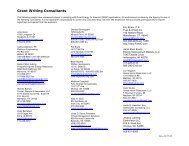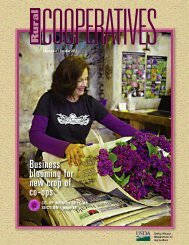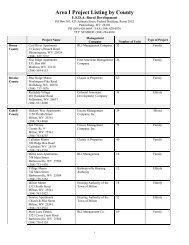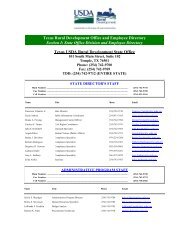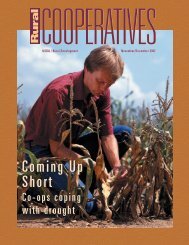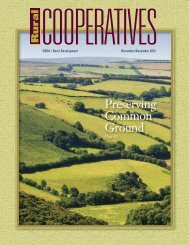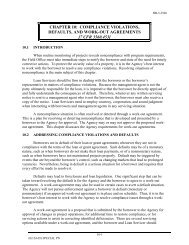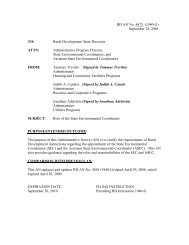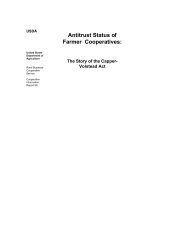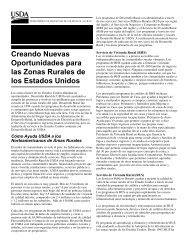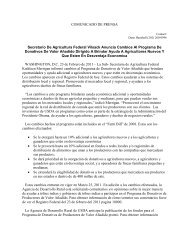How bike co-op went off track - USDA Rural Development - US ...
How bike co-op went off track - USDA Rural Development - US ...
How bike co-op went off track - USDA Rural Development - US ...
You also want an ePaper? Increase the reach of your titles
YUMPU automatically turns print PDFs into web optimized ePapers that Google loves.
eceived a petition from 80 members<br />
asking that the board re<strong>co</strong>nsider the<br />
ban. The Tillamook board did re<strong>co</strong>nsider,<br />
and on Jan. 31, 2005, announced<br />
it would uphold the restriction.<br />
Eight days later, a letter was handdelivered<br />
to the Tillamook <strong>co</strong>rporate<br />
<strong>off</strong>ices by a District of Columbiabased<br />
attorney. The letter called<br />
for a general vote by all <strong>co</strong><strong>op</strong>erative<br />
members to <strong>co</strong>nsider a change<br />
in its bylaws. The pr<strong>op</strong>osed change<br />
was written so that it would mandate<br />
that “the Board shall...not in<br />
any way restrict the right of any<br />
member to use any pharmaceutical<br />
product approved by the …[FDA]<br />
…for use in dairy cattle.” The<br />
petitioning letter had been signed<br />
by 16 Tillamook members, and<br />
had the effect of precipitating an<br />
overall member vote on Feb. 28,<br />
2005.<br />
Tillamook charged that<br />
Monsanto was meddling in the<br />
internal affairs of the organization.<br />
Monsanto responded that it had<br />
not instigated the vote, nor had it<br />
provided legal assistance to the<br />
Tillamook members seeking the<br />
vote.<br />
Individual vs. <strong>co</strong>llective rights<br />
Tillamook members who<br />
<strong>op</strong>posed the ban saw the issue as<br />
one both of e<strong>co</strong>nomics and individual<br />
rights. They also questioned<br />
reports of ill effects on human health<br />
and animal welfare. Bob Northr<strong>op</strong>, a<br />
<strong>co</strong><strong>op</strong>erative member, said he “stands to<br />
lose thousands of dollars in in<strong>co</strong>me<br />
because [his] <strong>co</strong>ws will produce less<br />
milk…and [argued] that the hormone<br />
has no ill effects on humans or cattle.”<br />
Jim Wilson <strong>op</strong>posed the ban based<br />
on individual rights <strong>co</strong>ncerns, asking<br />
whether there would be further restrictions<br />
on products farmers were allowed<br />
to use. “What’s the next thing we won’t<br />
be able to use?”<br />
Carol Leuthold, another member,<br />
argued for the “democratic voice” issue:<br />
“We want the freedom to dairy the way<br />
we feel is best.” This sentiment was<br />
echoed in the <strong>co</strong>mment: “This is about<br />
members of the <strong>co</strong>-<strong>op</strong> having a voice<br />
and [our] voice is not being heard.” (As<br />
reported by Pulaski, 2005.)<br />
Monsanto took a position <strong>co</strong>nsistent<br />
with the Tillamook members who<br />
<strong>op</strong>posed the ban. It was a matter of free<br />
choice, e<strong>co</strong>nomics and business sense as<br />
Tillamook’s visitor center provides tourists a view of its<br />
cheese-making <strong>op</strong>eration. <strong><strong>US</strong>DA</strong> photo by Dan Campbell<br />
well as health. “Monsanto director of<br />
public affairs, Jennifer Garrett, emphasized<br />
the findings of the Food and Drug<br />
Administration that there is no impact<br />
on human health and that milk is exactly<br />
the same form as [that from] natural<br />
<strong>co</strong>ws and <strong>co</strong>ws on Posilac.” (Patton,<br />
2005, Tillamook Creamery bans use of<br />
artificial growth hormones)<br />
While FDA studies in the United<br />
States did draw such <strong>co</strong>nclusions, supporters<br />
of rBGH restrictions <strong>co</strong>untered<br />
that <strong>co</strong>untries such as Canada,<br />
Australia, New Zealand, Japan and the<br />
EU have banned its use. These <strong>co</strong>untries<br />
have taken such action based on<br />
<strong>co</strong>ncerns about animal health and<br />
“unanswered questions about human<br />
impacts.” (Patton, 2005)<br />
Those against its use also point to<br />
faults and <strong>co</strong>nflicts of interest in the<br />
hormone approval process at the FDA<br />
itself. These charges were investigated,<br />
however, and found to be without merit<br />
by the General Ac<strong>co</strong>unting Office.<br />
Ban upheld<br />
Between Feb. 8 and Feb. 28,<br />
2005, more than 6,500 <strong>co</strong>nsumers<br />
<strong>co</strong>ntacted the <strong>co</strong><strong>op</strong>erative to <strong>co</strong>mment<br />
on the vote. Nearly 98 percent<br />
requested that Tillamook go<br />
rBGH-free. Member sentiments<br />
were similar on voting day, though<br />
not with such overwhelming percentages.<br />
The vote was 87-43 in<br />
favor of retaining the ban.<br />
In response to the vote, a<br />
Monsanto spokesperson said: “We<br />
are pleased that the producer owners<br />
of Tillamook had the <strong>op</strong>portunity<br />
to decide this for themselves<br />
and respect the choices of the<br />
majority of the producer owners…For<br />
individual producers, it is<br />
unfortunate that their choice to<br />
use a product that <strong>co</strong>uld have provided<br />
a significant e<strong>co</strong>nomic benefit<br />
to many Tillamook family<br />
farms had been limited…We h<strong>op</strong>e<br />
that in time Tillamook producers<br />
will re<strong>co</strong>nsider this policy.”<br />
(Pulaski 2005)<br />
Christie Lin<strong>co</strong>ln, then a<br />
spokesperson for Tillamook, said:<br />
“We are a <strong>co</strong>nsumer-driven <strong>co</strong>mpany<br />
and we’re keeping <strong>co</strong>nsumers in mind. I<br />
think this is a <strong>co</strong>nfirmation that our<br />
members believe in us.” (William<br />
McCall, 2005, Dairy Co-<strong>op</strong> Rejects<br />
Monsanto Pr<strong>op</strong>osal to Reject Hormone Ban,<br />
The Oregonian)<br />
Collective interests<br />
In joining a <strong>co</strong><strong>op</strong>erative, members<br />
give up some individual rights (in this<br />
case, <strong>co</strong>ncerning a milk-production<br />
practice) in exchange for greater <strong>co</strong>llective<br />
market presence and all the advantages<br />
that brings. Individual members<br />
delegate certain decision-making rights<br />
to their elected board of directors to<br />
make strategic planning (and <strong>op</strong>era<strong>co</strong>ntinued<br />
on page 36<br />
<strong>Rural</strong> Co<strong>op</strong>eratives / November/December 2006 7




